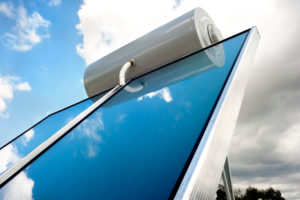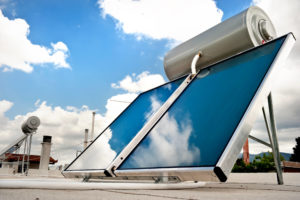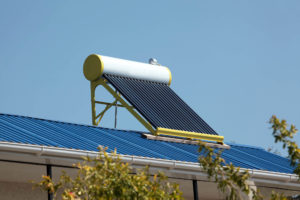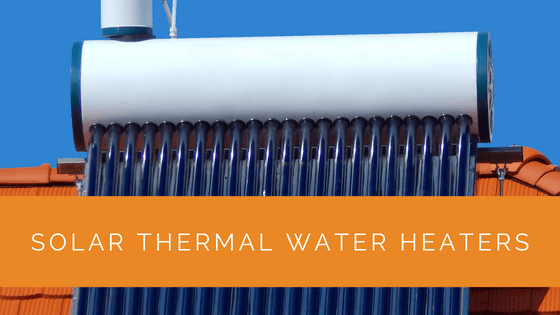As the world increasingly turns to renewable energy sources, solar thermal water heaters are becoming a popular choice for homeowners looking to reduce their energy bills and carbon footprint. These systems harness the power of the sun to heat water, providing an efficient and eco-friendly alternative to conventional water heaters. With the potential to save up to 50-80% on water heating bills, solar water heaters not only offer significant cost savings but also contribute to environmental sustainability.
This article delves into the components, workings, and types of solar thermal water heaters and offers insights into their benefits and cost-effectiveness. Whether you’re considering an upgrade to your current water heating system or exploring renewable energy options for the first time, this guide will help you make an informed decision.
Contents
- 1 Key Takeaways
- 2 Components and Working of a Solar Water Heater
- 3 Choosing a Solar Water Heater
- 4 The Best Types of Solar Water Heaters
- 5 Solar Water Heater Performance in Winter
- 6 Effectiveness of Solar Water Heaters
- 7 The Value of Solar Water Heating Systems
- 8 Saving Money on Solar Water Heaters
- 9 Solar Hot Water Heaters vs Domestic Solar System
- 10 Five Benefits of Buying a Solar Collector
- 11 Case Study: Enhancing Efficiency with Solar Thermal Water Heaters
- 12 Expert Insights From Our Solar Panel Installers About Solar Thermal Water Heaters
- 13 Experience Solar Excellence with Us!
- 14 Summary
Key Takeaways
- Solar water heaters can significantly save water heating bills, reducing electricity consumption by 50-80% and offering environmental benefits.
- Choosing the right solar water heater depends on available space, sunlight, capacity, regulations, and budget.
- Solar water heating systems come in two categories: active (with pumps and electricity) and passive (relying on gravity), each with various subtypes suited for different conditions.
Components and Working of a Solar Water Heater
Most solar water heating systems are typically made of various basic components such as:
- Solar collectors
- Thermal storage
- System controls and controllers
- A conventional water heater (as backup)
Solar water heating is a dependable, sustainable, renewable energy technology used to heat cold water. Sunlight strikes an absorber surface within an actual tank or solar collector and heats it. Then, potable water flows through the tubes attached to the absorber and catches its heat.
Solar water heating systems with a heat-transfer-fluid loop possess a heat exchanger that transfers heat to potable water. The heated water is kept in a distinct preheated water tank. At times, conventional solar storage tanks that store water are used instead. If extra heat is required, it’s provided by electricity or natural gas through the conventional water heating system.
Thermal storage is usually needed to sync the timing of the intermittent solar resource with the timing of the hot water load. Generally, a couple of gallons of water per square foot of collector area is enough. This water can be potable or non-potable if a load-side exchanger is used.
In conclusion, a solar water heater preheats the water to the conventional heating system. They are engineered to handle 41% to 70% of the water heating load. Nonetheless, a backup conventional water heating system must meet 100% of the peak hot water requirement.
These backup heating systems provide water during cloudy days or when the solar panels are down.

Choosing a Solar Water Heater
There are several kinds of solar water heaters available on the market. But, purchasing a solar heater without considering your needs and circumstances isn’t the best idea. Surprisingly, the costliest solar water heater system might not suit your house either.
The right solar water heater for you will depend on the following factors:
- Free space
- Availability of sunlight
- Capacity requirements
- Residence codes and regulations
- Budget
The Best Types of Solar Water Heaters
These hot water systems are divided into two categories, namely active and passive. The significant difference is active water heating systems need circulating pumps to circulate water, while a passive hot water system relies on the gravitational pull to do the same.
In addition to pumps, active systems require electrical energy and may contain an antifreeze in heat-exchanging fluid form. Water gains heat in a tube and is piped directly through a faucet within the fundamental passive solar collectors.
Below are different passive and active systems and how they can benefit you.
Active Solar Water Heaters
Although these water heaters are pricier than passive systems, they make up for their efficiency. There are a couple of types of an active solar water heaters.
Active Direct Solar Hot Water Heater
Household water goes through the solar collectors into the useable water-storing unit inside active direct systems. They’re most appropriate for warmer regions where temperatures rarely go under the freezing point.
Active Indirect Solar Hot Water Heater
An anti-freezing liquid circulates through the tubes present in solar collectors in an active indirect water heating system. Subsequently, the fluid’s heat is shifted over to the water. Consequently, the heated potable water is poured into a storage tank for homely purposes.
Active indirect solar water heating systems are essential during cold climates, frequently dipping below freezing. Without an active water heating system, pipes are susceptible to freezing.
Passive Solar Water Heaters
These water heater systems are less expensive and less efficient than active systems. Nevertheless, they’re more reliable, last longer, and cost-effective if you’re on a tight budget. A passive system uses pressure and gravitational force to move water properly and has several variants.
Integral Collector Storage Systems and Batch Heaters
Integral Collector Storage systems are one of the most easily operable among other solar water heating systems. Although they’re adequately efficient, they don’t function in cold weather climates with a chance of freezing temperatures.
These hot water systems are as standard as a massive black water tank or several smaller copper tubes welded to a ceiling. Besides, copper tubing units heat quicker because of the larger surface area and emit heat faster due to the same.
An ICS heating system is typically used for preheating water for domestic systems. Once water is required, it exits storage tanks to enter the conventional water heaters.
The most crucial element to consider in an ICS solar water heating system is its size. They’re enormous and heavy since storage tanks are themselves the collectors. As a result, your wall’s structure should be sturdy enough to enable the functioning of such a system.
Thermosyphon Water Heating Systems
Thermosyphon systems depend on solar heating and thermal circulation instead of natural circulation. Water moves once cool water goes under, warm water goes up, and heat transfer occurs. A Thermosyphon system possesses a tank similar to ICS systems.
The collectors are attached at a descending angle from the tank to enable a thermal circulation system. This system gathers sunlight and returns heated water to the storage tank through a heat pipe or closed loop. Thermosyphon systems are much more efficient than ICS solar water heaters but can’t be operated in regions with freezing temperatures.

Solar Water Heater Performance in Winter
Most solar water heaters are unable to function with optimum efficiency during winter. Passive systems and active direct solar water heaters are examples of such systems. However, active indirect systems are specifically designed to perform during cold weather due to non-freezing fluids.
Effectiveness of Solar Water Heaters
The efficiency of solar hot water heating systems is highly dependent on the design and material of the absorber plate. According to the calculations, the collector efficiencies of a solar heating system are 78.5% and 81.7%, while the tank efficiencies are in the range of 71% and 78%. The performance of these systems falls a bit in cold regions due to insufficient solar radiation.
The Value of Solar Water Heating Systems
Solar water heater systems’ value increases with continuous hot water usage. Furthermore, it’s most economical for households consisting of numerous family members.
This water heater costs around $9000, excluding federal incentives. The high-end models cost around $13000, whereas a smaller solar water heater costs $ 1500.
Prices fluctuate based on various factors, such as:
- Material of construct
- System size
- Maintenance cost
- Installation cost
- Weight and size
While passive solar water heaters are the most cost-effective option, costing $4000 per 60 gallons, they don’t function in all weather. If your house structure won’t support a heavy passive system, it’s best to go for an expensive active solar collector.
You can add the price of a solar water heating system to your mortgage if you’re building a new house. Adding the charge to a 30-year property loan will cost you less than $30 monthly. After tacking federal incentives, the same amount will go down to $15 a month.
Apart from the cost to buy and install these systems, it would be best if you considered the annual operating expenses. In a typical passive system, it isn’t very important. However, you’ll have to pay extra heating costs in conventional systems working in harmony with solar heaters.

Saving Money on Solar Water Heaters
To your fortune, you don’t have to bear the entire cost of this type of water heating system. You can use the federal tax credits system to decrease installation costs and significantly save money.
Federal Residential Renewable Energy Tax Credits or Investment Tax Credits (ITC) can offer a tax credit of 26 percent on solar water heaters. This benefit is to encourage the use of energy-saving devices. However, there are a few conditions to become eligible:
- At least 50% of the energy produced from the structure should come from solar heating, solar panels, or photovoltaic cells.
- The system should belong to a range of solar water heaters certified by the Solar Rating and Certification Corporation (SRCC).
- You shouldn’t use solar heating systems to heat water in hot tubs or swimming pools. They should be purely used for business or home purposes.
You might wonder about the cost difference between buying solar water heaters and building them yourself.
Solar Hot Water Heaters vs Domestic Solar System
Solar water heaters are now much more uncommon compared to the past. This decline is primarily because of the significant decrease in solar panels prices. As a result, people have started installing solar panels to convert solar power into heat or thermal energy.
Property owners who wish to utilize their free space are inclined to buy their solar panels. This way, they can generate heat and energy at their will through solar radiation and enjoy their home’s hot water.
Solar collectors are a good investment if space is scarce, as they consume much less than solar panels. Solar water heaters are a wise option for people living in unreachable and remote areas. Besides, they can also serve as an environment-friendly bonus to existing solar energy generators.
Although modern water heaters are highly efficient, solar hot water heating systems yield massive savings and reduce environmental impact. Most systems with similar potential to save the environment are worth buying, and here’s why!
Five Benefits of Buying a Solar Collector
Eco-friendly water heaters, aka solar collectors, might not reduce your water consumption, but they come with the following benefits:
- It helps fight climate change by reducing carbon and other greenhouse gas emissions.
- Solar radiation in solar heaters discourages coal burning for energy and heat generation, protecting air quality.
- Dependency on fossil fuel power plants is the leading cause of water intoxication, tackled using solar heaters.
- It can help you save almost 80% of your monthly water bills.
- Research shows that houses with solar energy-based technologies sell faster and at higher prices than those without.
Case Study: Enhancing Efficiency with Solar Thermal Water Heaters
Background
At Solar Panels Network USA, we specialize in providing sustainable energy solutions tailored to meet the diverse needs of our clients. One of our recent projects involved a family seeking to reduce their reliance on conventional energy sources by installing a solar thermal water heater.
Project Overview
The client, a family of four living in a suburban area, wanted to cut down on their electricity bills and reduce their environmental impact. They were particularly interested in a system that could handle the majority of their hot water needs while being cost-effective in the long run.
Implementation
Initial Assessment
After assessing the family’s hot water usage and the space available for installation, we recommended an active indirect solar water heater. This type of system was chosen due to its efficiency and ability to perform well in colder climates, where temperatures often dip below freezing.
Installation Process
The installation process involved setting up solar collectors on the roof to maximize sunlight exposure. We installed a heat exchanger and an antifreeze solution to ensure the system operated efficiently even during the winter months. The system was connected to an insulated storage tank that preheats the water before it enters the conventional water heater.
Optimization and Training
To ensure the system’s optimal performance, we provided the family with guidance on maintenance practices, such as regular cleaning of the solar collectors and checking the antifreeze levels. We also installed a monitoring system to track the performance of the solar water heater and ensure it met the family’s hot water needs.
Results
Significant Cost Savings
The solar thermal water heater reduced the family’s water heating bills by approximately 70%, translating to substantial savings on their overall energy costs. The system’s efficiency in capturing and utilizing solar energy meant that even on cloudy days, the water was preheated significantly, reducing the load on the conventional heater.
Environmental Impact
The installation of the solar thermal water heater significantly reduced the family’s carbon footprint. By relying more on renewable solar energy, the household decreased its dependence on fossil fuels, contributing to lower greenhouse gas emissions.
Customer Satisfaction
The family was extremely satisfied with the results. They appreciated the seamless integration of the solar water heater with their existing system and the noticeable reduction in their energy bills. The system’s durability and low maintenance requirements were also significant advantages.
Summary
This case study highlights the effectiveness of solar thermal water heaters in reducing energy costs and environmental impact. By choosing the right type of system and ensuring proper installation and maintenance, households can significantly benefit from this renewable energy solution. At Solar Panels Network USA, we continue to leverage our expertise to deliver sustainable and efficient solar energy solutions to our clients.
Expert Insights From Our Solar Panel Installers About Solar Thermal Water Heaters
Solar thermal water heaters are an excellent investment for reducing energy bills and carbon footprint. They harness the sun’s energy effectively, providing hot water while being environmentally friendly.
Senior Solar Installer
Choosing the right type of solar water heater is crucial. Active systems with pumps are more efficient, especially in colder climates, whereas passive systems are cost-effective and ideal for warmer regions.
Lead Solar Technician
The durability and low maintenance of solar thermal water heaters make them a reliable choice for households looking to save on energy costs in the long run.
Solar Installation Manager
Experience Solar Excellence with Us!
Trust in Solar Panels Network USA, where our seasoned experts deliver top-quality solar solutions for homes and businesses nationwide. With a legacy of countless successful installations and a commitment to sustainable energy, we’re your reliable partner in the solar journey. Ready for a brighter, eco-friendly future? Call us now at (855) 427-0058 and harness the sun’s power!
Summary
The sun doesn’t shine all day, so using traditional water heaters as a backup is okay. Habits like doing laundry on a sunny day can help save water and energy. Moreover, you can contact any local solar company to enquire about the rebates they offer for installing solar water heaters.
About the Author
Solar Panels Network USA stands at the forefront of solar energy solutions, driven by a team of seasoned solar engineers and energy consultants. With over decades of experience in delivering high-quality solar installations and maintenance, we are committed to promoting sustainable energy through customer-centric, tailored solutions. Our articles reflect this commitment, crafted collaboratively by experts to provide accurate, up-to-date insights into solar technology, ensuring our readers are well-informed and empowered in their solar energy decisions.

